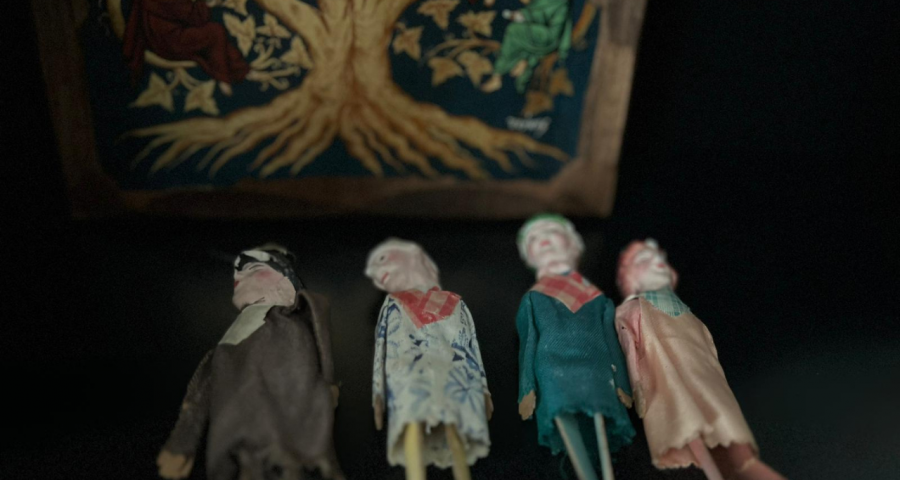CounterEconomics/3 – Once again on the latest attempt that the market is making to resist the wind of vanitas
By Luigino Bruni
Published in Avvenire 19/03/2023
"What scares me most is the suffering that rolls through the world like a steamroller. I care little about guilt, little about justice, little about truth, little about beauty: I do care about suffering."
Sergio Quinzio, An attempt to bridge the abyss (Un tentativo di colmare l’abisso)
The consultant's departure from the scene at the end of the process is part of its excellence. In the book of Daniel, there are precious indications on how to interpret the visions of others without becoming their masters.
The environmental, financial and military crises of the beginning of this millennium risk making us underestimate or forget a no less serious triple crisis: of faith, of great narratives and of generating. A world that no longer awaits paradise, without collective narratives and without children, no longer finds sufficient meaning to live and therefore to work. Why should I work if I no longer hope for a promised land (up in or below heaven), if I have no one who expects a better present and future from my work? The world of work has never created or exhausted the meaning of work. Once upon a time, it was family, ideologies, religion that gave work its first meaning. The factory, the fields or the office reinforced that sense which, however, was born outside of it. Work is grand, but to be seen in its grandeur it must be looked at from the outside, from a door that opens onto the outside. Without this large space, the work room becomes too narrow, its roof too low for that infinitely sick animal called homo sapiens to be able to stay there for any longer period of time without asphyxiating.
Our Constitution is built on work because work was built on something else. The economy is registering a growing unease in the sphere of work: but when will we understand that this work related unease is first and foremost an existential unease generated by this triple famine? «Where has God gone?… I wish to tell you! We killed him – you and I! We are all his killers!… Are we not wandering in an infinite nothingness?» (F. Nietzsche, The Gay Science). That mad man cries out the death of God in the «marketplace», since «many of those who did not believe in God were gathered right there». In the marketplace, the herald of God's death «caused great laughter» (The Gay Science, 125). The merchants laughed; perhaps because they hoped that that "super-man" needed to live in a world without God would be homo economicus, thanks to his new capitalist religion. However, the merchants who were laughing yesterday are now realizing that that infinite nothingness is devouring the economy itself. Consulting is the latest attempt that the market is making to resist the wind of vanitas. Because no superman has yet appeared on the horizon line of this earth without gods, instead, we have seen an increasingly fragile and lonely man. Suffering, hidden by the funny mask of hedonism.
Last time we left the concept of the consultants while reflecting on the matter of subsidiarity. One last step is still missing: a good subsidiary consultancy must know how to leave at the right time. Having finished his work, a consultant must know how to withdraw, disappear, exit the process in order not to transform the link into a bond, favouring the autonomy of those who he has helped. However, since there is also a dimension of potential conflict of interest in consultancy, (the assistance is also invoiced and paid for), the exit is never easy or guaranteed. Thus, sometimes, the relationship of assistance lasts a bit too long and therefore risks becoming perverted. The non-exit is often desired by the "client" who during the process of assistance has progressively developed a relationship of dependence on his assistants. Thus the precious art of the consultant (who deals with people and relationships) and of the assistant lies in his or her ability to disappear, to let go. Becoming less and less necessary overtime, until he is no longer needed – this final uselessness should be his explicit objective, herein lies his excellence. On the other hand, when the passage of time increases the need for the consultant, the consultancy in question is actually failing and the risk of manipulation increases: from being an aid in discerning problems and their solutions, the consultant becomes the one who decides and governs: though he once came in to serve, he now ends up commanding.
Another essential dimension of good consultancy and organizational accompaniment is once again suggested by the Bible, in the Book of the prophet Daniel, the great dreamer and interpreter of dreams. Dream interpreters in the ancient world were a profession on the crossline between art and science, at the service of those in power above all. They were seen as bringing order to an unfamiliar and menacing world. One day, Daniel has a "difficult" dream - the one about the mysterious "son of man", a figure dear to Jesus (Daniel 7,13-14). He has a vision in a dream – note that vision is one of the great words of counselling. However, this time Daniel fails to understand the meaning; he gets agitated and becomes upset, and hence he asks for help from an angel-interpreter: «I, Daniel, was troubled in spirit, and the visions that passed through my mind disturbed me. I approached one of those standing there and asked him the meaning of all this. So he told me and gave me the interpretation of these things» (Daniel 7,15-16). Although he is an interpreter of dreams, his own and those of others, Daniel now needs the assistance of a third party, another interpreter - the same situation is then repeated in the next chapter (8).
The need "of an interpreter for the interpreter" tells us something important. Dream interpretation has a relational and ternary nature. From being binary (A-B), a good relationship of assistance and accompaniment must, in fact, become ternary (A-B-C), because the opening of the relationship to a third party (C) protects the interpreter from becoming the master of the dreams he is interpreting. The third is the possibility of the interpreter’s chastity. However, for this opening to be activated, the interpreter needs to feel the "disturbance", because he feels his own insufficiency in the face of the dream. The greatest danger is the lack of this awareness of need, when the counsellor never feels or no longer feels the need to ask for help from an external "angel". Good subsidiary advice is therefore a relationship open to a third party. This is the biblical foundation of supervision, which is mandatory in many forms of counselling today – though not all. When the interpreter does not in turn have another interpreter, the relationship tends to close in on itself into a binary relationship, something that is always dangerous but especially serious with particularly difficult visions, which remain sealed because the "two" has not become "three".
The Book of Daniel, a great manual for dreamers and interpreters, contains another particularly interesting episode. At the beginning of the story, King Nebuchadnezzar has a mysterious dream. In fact, he is so agitated by it «and he could not sleep» (Daniel 2,1) because he did not know how to interpret it. He thus summons all the soothsayers and haruspices of the kingdom, but none of them succeeds. Also, a curious and decisive detail: the king does not tell the interpreters the dream that needs to be interpreted, he asks them to narrate it. Why? He had not forgotten it. No, he had a different reason. If the king revealed his dream, Babylonian culture possessed sophisticated handbooks of oneiromancy which deconstructed dreams into their essential elements and thus always produced a response. The dream would have been explained by the technique; the king, however, wanted something more, he felt that technique alone was not enough for that different and special kind of dream. The king was therefore afraid that his dream would be manipulated by the experts and technicians, who exercised great and seductive power over the sovereigns – all interpreters are fascinating as they are repositories of mysterious knowledge. He therefore wants a guarantee that his interpreter is being honest, and in that world being honest meant being a messenger of God: therefore being a prophet, that is, someone moved by gratuitousness, by vocation and not merely by profit and power. Finally, Daniel, a true prophet, arrives «During the night the mystery was revealed to Daniel in a vision» (Daniel 2,19).
For many ordinary consultants techniques are enough. However, some kinds of discernment and interpretation require a combination of both technique and vocation to truly work and be "free". In these rare but decisive cases, interpreting the recounted vision is not enough; we have to guess it before having it retold to us. Here, the dream itself becomes the necessary third party. This is relevant in those very complex and delicate situations where the very existence of the institution or of the community is at stake. In these cases, the consultant is required to make spend an extraordinary amount of time, resources, energy and face the risk of failure, choices that are not only justified in terms of the contract and the fee, an expenditure that goes beyond any ordinary small costs. It soon becomes clear that trying to solve the case will take much more than what is usually done. Thus, we can decide to quit early on or not to start all; but we can also decide to stay, and by staying we reveal our vocation, telling ourselves that there is a greater honour in it than the fee, that we are interested in being in the world and not just being in the market. These choices almost always remain hidden from the "customers", but are kept deep in the wine cellar of the heart. Sometimes, however, someone does notice, and that deep, slow and timeless kind of listening makes the other party understand that we are not working merely with technique. Techne joins psyche and competence joins the soul. Furthermore, when the other party understands that we are also working by vocation, a different quality of trust is born in him/her and he lets us enter the secret rooms of his dreams, where the key to the solution of his interpretation can often be found. Some things can be said to the experts or technicians, a lot is said to the soul, but everything can be divulged when technique is applied together with the soul.
However, there is something more. That dialogue between Daniel and the angel-interpreter takes place during a vision. The exegete of the dream can be found within the dream itself. In many cases, it is possible, and perhaps even good, for the interpreter to find himself outside of the dream, therapeutic distance is often very important – sometimes it is good for the interpreter to be "awake" while we are dreaming. Nevertheless, in some different kinds of dreams and visions, the interpreter must find himself within our very dream; the angel must be someone who knows us intimately because he finds himself within the same experience, a character in a shared vision. Sometimes we cannot decipher our problems because the interpreter is too close; other times, often when it is crucial, the explanation of our vision can be found right at home, yet we seek it far away. When moving from for-profit companies to the civil economy, even arriving at religious communities, in order to understand some "visions", the kind that leave us sleepless during many nights for many years, the interpreter must stay inside. Here the only good therapeutic distance is equal to zero. These interpreters know the vision before we tell them about it because it is their vision too.
A consultant who approaches an idealistic non-profit organization from the outside, which generally does not belong to their charismatic dream, must be well aware of being an "angel" outside the dream. He or she then has to spend a lot of time and energy trying to daydream, trying to get inside that nightly vision without actually being there. Then, after a long time spent in mild silence, he needs to say a few words as if he were that angel while aware that he is not. Remembering and reminding everyone every day, until the end, that he is not the interpreter that they really need. It is from the awareness of this fragility that his true usefulness can arise.













